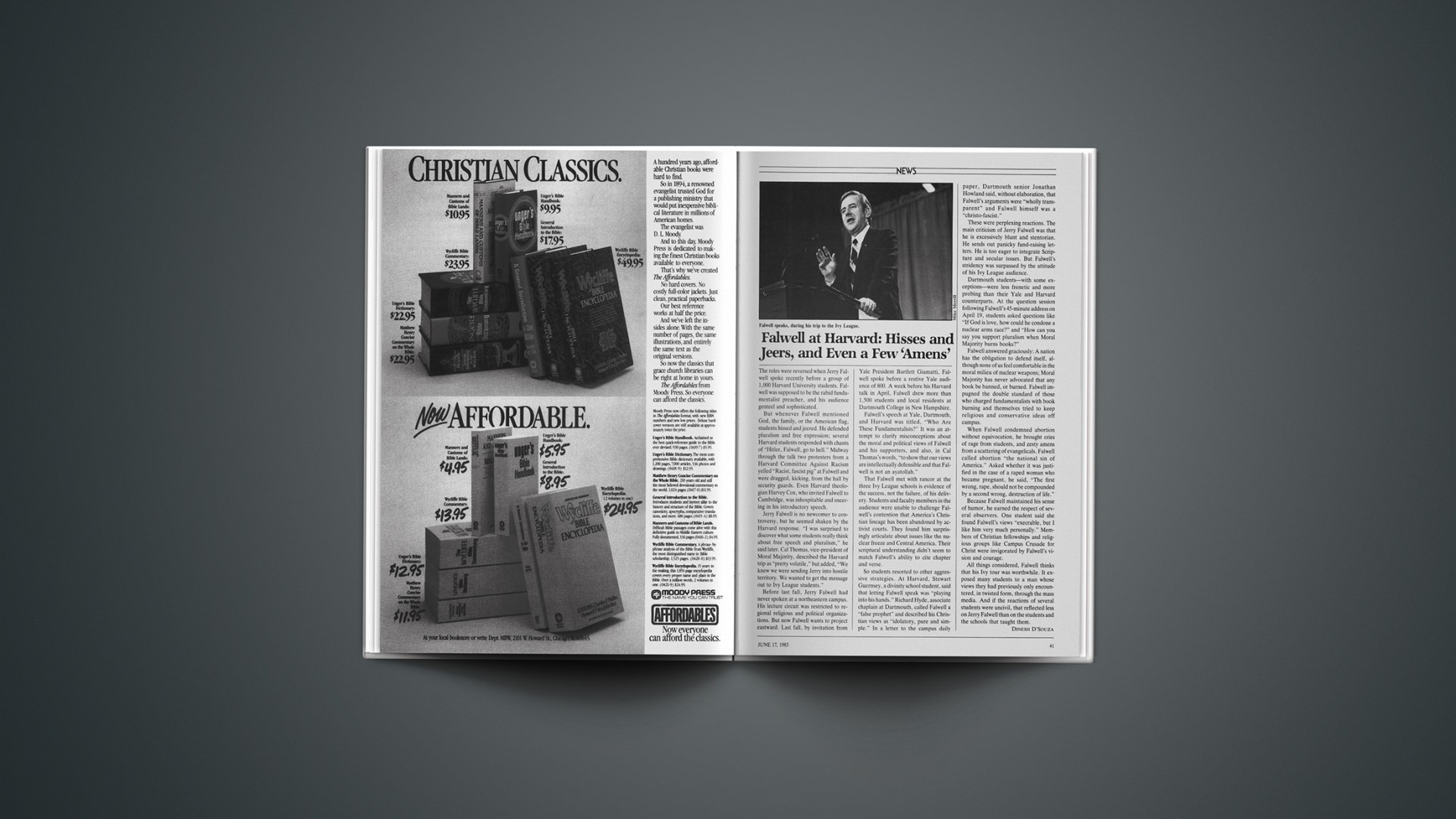The roles were reversed when Jerry Falwell spoke recently before a group of 1,000 Harvard University students. Falwell was supposed to be the rabid fundamentalist preacher, and his audience genteel and sophisticated.
But whenever Falwell mentioned God, the family, or the American flag, students hissed and jeered. He defended pluralism and free expression; several Harvard students responded with chants of “Hitler, Falwell, go to hell.” Midway through the talk two protesters from a Harvard Committee Against Racism yelled “Racist, fascist pig” at Falwell and were dragged, kicking, from the hall by security guards. Even Harvard theologian Harvey Cox, who invited Falwell to Cambridge, was inhospitable and sneering in his introductory speech.
Jerry Falwell is no newcomer to controversy, but he seemed shaken by the Harvard response. “I was surprised to discover what some students really think about free speech and pluralism,” he said later. Cal Thomas, vice-president of Moral Majority, described the Harvard trip as “pretty volatile,” but added, “We knew we were sending Jerry into hostile territory. We wanted to get the message out to Ivy League students.”
Before last fall, Jerry Falwell had never spoken at a northeastern campus. His lecture circuit was restricted to regional religious and political organizations. But now Falwell wants to project eastward. Last fall, by invitation from Yale President Bartlett Giamatti, Falwell spoke before a restive Yale audience of 800. A week before his Harvard talk in April, Falwell drew more than 1,500 students and local residents at Dartmouth College in New Hampshire.
Falwell’s speech at Yale, Dartmouth, and Harvard was titled, “Who Are These Fundamentalists?” It was an attempt to clarify misconceptions about the moral and political views of Falwell and his supporters, and also, in Cal Thomas’s words, “to show that our views are intellectually defensible and that Falwell is not an ayatollah.”
That Falwell met with rancor at the three Ivy League schools is evidence of the success, not the failure, of his delivery. Students and faculty members in the audience were unable to challenge Falwell’s contention that America’s Christian lineage has been abandoned by activist courts. They found him surprisingly articulate about issues like the nuclear freeze and Central America. Their scriptural understanding didn’t seem to match Falwell’s ability to cite chapter and verse.
So students resorted to other aggressive strategies. At Harvard, Stewart Guernsey, a divinity school student, said that letting Falwell speak was “playing into his hands.” Richard Hyde, associate chaplain at Dartmouth, called Falwell a “false prophet” and described his Christian views as “idolatory, pure and simple.” In a letter to the campus daily paper, Dartmouth senior Jonathan Howland said, without elaboration, that Falwell’s arguments were “wholly transparent” and Falwell himself was a “christo-fascist.”
These were perplexing reactions. The main criticism of Jerry Falwell was that he is excessively blunt and stentorian. He sends out panicky fund-raising letters. He is too eager to integrate Scripture and secular issues. But Falwell’s stridency was surpassed by the attitude of his Ivy League audience.
Dartmouth students—with some exceptions—were less frenetic and more probing than their Yale and Harvard counterparts. At the question session following Falwell’s 45-minute address on April 19, students asked questions like “If God is love, how could he condone a nuclear arms race?” and “How can you say you support pluralism when Moral Majority burns books?”
Falwell answered graciously: A nation has the obligation to defend itself, although none of us feel comfortable in the moral milieu of nuclear weapons; Moral Majority has never advocated that any book be banned, or burned. Falwell impugned the double standard of those who charged fundamentalists with book burning and themselves tried to keep religious and conservative ideas off campus.
When Falwell condemned abortion without equivocation, he brought cries of rage from students, and zesty amens from a scattering of evangelicals. Falwell called abortion “the national sin of America.” Asked whether it was justified in the case of a raped woman who became pregnant, he said, “The first wrong, rape, should not be compounded by a second wrong, destruction of life.”
Because Falwell maintained his sense of humor, he earned the respect of several observers. One student said she found Falwell’s views “execrable, but I like him very much personally.” Members of Christian fellowships and religious groups like Campus Crusade for Christ were invigorated by Falwell’s vision and courage.
All things considered, Falwell thinks that his Ivy tour was worthwhile. It exposed many students to a man whose views they had previously only encountered, in twisted form, through the mass media. And if the reactions of several students were uncivil, that reflected less on Jerry Falwell than on the students and the schools that taught them.










